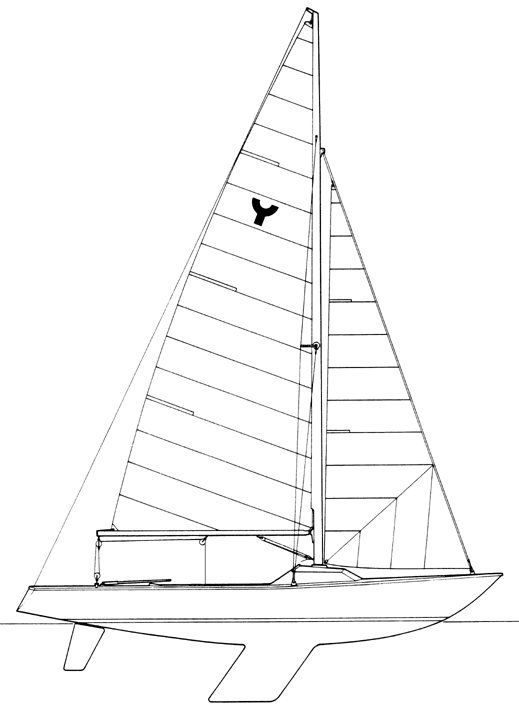The Yngling, a sleek and seaworthy keelboat measuring just over 20 feet, embodies the spirit of one-design racing. Designed for competitive sailing, it masterfully blends the responsive handling of a planing dinghy with the stability and safety of a larger keelboat. This design ethos made it a popular choice for aspiring racers and, notably, led to its designation as an Olympic class for women sailors from the 2004 Athens Games through the 2008 Beijing Games. While its lineage hails from Norway, the Yngling has been constructed by various esteemed builders globally, including Petticrows, a yard renowned for its commitment to high-performance sailboat construction.
Yngling Information, Review, Specs

- Make
- Model
- Number Built
- 4500
- Production Year(s)
- 1967 - ??
History and Design
The Yngling was conceived in 1967 by the prolific Norwegian naval architect Jan Herman Linge. Linge, also the designer of the popular Soling keelboat, envisioned the Yngling as a dedicated one-design racer, serving as both a competitive platform in its own right and an ideal training or recruiting boat for those transitioning to the larger Soling class. His design philosophy prioritized a boat that would "sail beautifully," offering a delicate yet fast upwind performance. The emphasis on strict one-design rules ensures that racing success hinges on the skill of the crew rather than technological advantage, with strict control over hull and deck moulds by World Sailing.
The Yngling's construction is characterized by exceptional rigidity and durability, leading to hulls that remain competitive even decades after their initial build. While the original design dates back to the late 1960s, Linge himself revisited the interior layout in 1990, introducing a watertight design to enhance the boat's practicality and safety. Petticrows, a builder known for its meticulous craftsmanship and expertise in fiberglass construction, particularly within the International Dragon class, continues the tradition of building high-performance sailboats like the Yngling. This reflects their broader commitment to integrating sound engineering principles with elegant style in composite construction.
Sailing Performance and Handling
True to its design brief, the Yngling is lauded for its exceptional sailing characteristics. Owners consistently praise its balance and responsiveness, often remarking that the boat "sails beautifully." It offers a unique sailing experience, described as an "agreeable cross between a planing dinghy and a keelboat." Despite its compact size, the Yngling provides a stable and safe platform due to its fin keel and ample ballast, yet it delivers a lively, dinghy-like performance. This combination results in a boat that is capable of a "delicate and fast upwind groove," making it highly rewarding for competitive sailors. Its precise handling and inherent stability contribute to the deep loyalty expressed by those who sail it.
Accommodations and Layout
As a dedicated one-design racing keelboat, the Yngling's design prioritizes performance and on-water functionality over extensive interior accommodations. The boat features an open cockpit layout designed for efficient crew movement and sail handling during racing. While a small cuddy cabin might be present in some configurations, it is primarily intended for basic gear storage rather than comfortable living spaces. Headroom is minimal to non-existent, reflecting its purpose as a day sailer and racer rather than a cruising yacht. The interior layout focuses on keeping the boat light and simple, consistent with its racing pedigree.
Owner's Perspectives
The Yngling has garnered a strong and loyal following among its owners, who frequently highlight its robust construction and enduring competitiveness. Many owners appreciate the boat's stability and safety, which allows for confident sailing even in challenging conditions, while still delivering an exciting, dinghy-like feel. The durable fiberglass hull construction means that even older Ynglings can remain highly competitive with newer models, a testament to the quality of the original design and manufacturing. Owners value the boat's pure sailing performance and its role as a challenging yet rewarding platform for one-design racing. While generally praised, the Yngling's design as a pure racer means that any desire for significant interior comfort would necessitate extensive and often impractical modifications.
Measurements
Construction & Hull
- Construction Material
- Fiberglass (Solid)
- Hull Type
- Monohull Sailboat
- Keel Type
- Fin
- Rudder
- 1x Spade
- Ballast
- 683 lbs (Lead)
- Displacement
- 1323 lbs
- Water Capacity
- -
- Fuel Capacity
- -
Engine
- Engine Make
- —
- Engine Model
- —
- Engine Type
- —
- Engine HP
- —
- Engine Count
- 1
- Drive Type
- —
- Fuel Type
- —
Rig & Sails
- Rig Type
- Fractional Sloop
- P (Main Luff)
- 22.31 ft
- E (Main Foot)
- 8.53 ft
- I (Foretriangle Height)
- 18.7 ft
- J (Foretriangle Base)
- 6.56 ft
- Forestay Length (est)
- 19.82 ft
- Main Sail Area
- 95.15 sqft
- Foretriangle Sail Area
- 61.34 sqft
- Total Sail Area (Reported)
- 156 sqft
- Total Sail Area (Calc)
- 156.49 sqft
Dimensions
- LOA
- 20.83 ft
- LWL
- 15.42 ft
- Beam
- 5.67 ft
- Draft
- 3.44 ft
- Max Headroom
- -
- Air Draft
- -
Calculations
- Hull Speed
- 5.26 kn
- Pounds per Inch Immersion
- 312.4